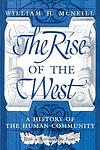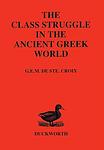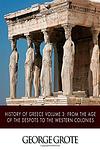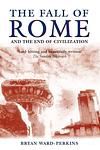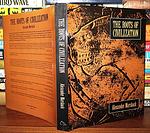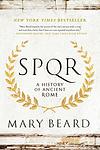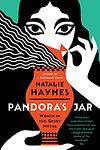The Greatest American, British "Nonfiction, Ancient History" Books of All Time
Click to learn how this list is calculated.
This list represents a comprehensive and trusted collection of the greatest books. Developed through a specialized algorithm, it brings together 305 'best of' book lists to form a definitive guide to the world's most acclaimed books. For those interested in how these books are chosen, additional details can be found on the rankings page.
Genres
Ancient History is a category of books that focuses on the study of human civilizations and societies that existed in the distant past, typically before the Middle Ages. This genre encompasses a wide range of topics, including the rise and fall of empires, the development of religions and cultures, the evolution of technology and science, and the political and social structures of ancient societies. Ancient History books provide readers with a glimpse into the lives and experiences of people who lived in a vastly different world than our own, offering insights into the origins of modern civilization and the forces that shaped our world today.
Countries
Date Range
Reading Statistics
Click the button below to see how many of these books you've read!
Download
If you're interested in downloading this list as a CSV file for use in a spreadsheet application, you can easily do so by clicking the button below. Please note that to ensure a manageable file size and faster download, the CSV will include details for only the first 500 books.
Download-
1. The Decline and Fall of the Roman Empire by Edward Gibbon
This historical work provides a comprehensive perspective on the fall of the Roman Empire, examining its decline from the height of its power in the second century A.D. through the fall of Constantinople in 1453. The author meticulously chronicles the empire's deterioration due to a variety of factors, including moral decay, economic crisis, military incompetence, barbarian invasions, and internal power struggles, while also offering insightful commentary on the broader implications for Western civilization.
The 370th Greatest Book of All Time -
2. A Study of History by Arnold J. Toynbee
"A Study of History" is an extensive 12-volume universal history, exploring the development and decay of world civilizations throughout the ages. The author proposes that civilizations rise and fall based on their responses to challenges, both physical and social. The book also puts forth the idea that religions play a crucial role in the rise of civilizations and that the failure of a civilization's creative power can lead to its decline. The work is renowned for its scholarly depth and its controversial theories about the cyclical nature of history.
The 982nd Greatest Book of All Time -
3. The Rise of the West by William H. McNeill
"The Rise of the West" is a comprehensive historical narrative that explores the development of Western civilization from the early stages of human history to the 20th century. The book provides a detailed analysis of various civilizations around the world, their interactions, and the resulting cultural exchanges that have shaped the modern world. It also discusses the significant factors, such as technological advancements, religious transformations, and political changes, that have contributed to the West's ascendancy.
The 3442nd Greatest Book of All Time -
4. Themis by Jane E. Harrison
"Themis" is a scholarly work that delves into the origins and development of ancient Greek religion, focusing particularly on the social aspects of ritual and myth rather than the theological specifics. The book examines the concept of Themis, traditionally associated with divine order and law, and explores how this concept relates to the collective consciousness and practices of early Greek society. Through a detailed analysis of rituals, festivals, and myths, the author argues that Themis plays a central role in creating and maintaining social order and cohesion among the ancient Greeks. The study draws extensively on literary and archaeological sources to reconstruct the religious atmosphere of ancient Greece, providing insights into how early Greeks understood their world and the divine forces that shaped it.
The 5947th Greatest Book of All Time -
5. The Greeks And The Irrational by E.R. Dodds
In "The Greeks and the Irrational," the author explores the concept of irrationality within ancient Greek culture, challenging the traditional view of the Greeks as pioneers of rational thought. The book delves into various aspects of Greek society, including religion, philosophy, and literature, to uncover the presence and acceptance of irrational elements such as divine inspiration, prophecy, and mystical practices. By examining these aspects, the work argues that irrationality was integral to the Greek worldview and that acknowledging this can lead to a more nuanced understanding of ancient Greek civilization and its contributions to Western thought.
The 5947th Greatest Book of All Time -
6. The Class Struggle In The Ancient Greek World by G.E.M. de Ste. Croix
"The Class Struggle in the Ancient Greek World" is a comprehensive historical analysis that explores the dynamics of class conflict from the earliest times in ancient Greece up to the Roman Empire. The book delves into how social and economic factors shaped class relations and examines the extent to which class struggle influenced political developments and historical outcomes in the ancient world. Through meticulous examination of sources and evidence, the work challenges traditional views of ancient society by highlighting the significance of class divisions and conflicts as central elements in the historical progression of the Greek and Roman periods.
The 6438th Greatest Book of All Time -
7. History Of Greece by George Grote
This book provides a comprehensive analysis of Greek history, from its earliest periods in ancient times through the Hellenistic era. The author meticulously details the political, social, and cultural developments of various Greek city-states, emphasizing the democratic processes of Athens and the military prowess of Sparta. Through a critical examination of sources and a narrative enriched by philosophical and ethical insights, the work explores the rise and fall of Greece, its interactions with neighboring civilizations, and its lasting impact on Western thought and civilization.
The 6745th Greatest Book of All Time -
8. The Fall Of Rome by Bryan Ward-Perkins
"The Fall of Rome" presents a compelling argument that the decline of the Roman Empire was both a rapid and devastating event, challenging the notion of a gentle transformation. The author uses archaeological evidence and material culture, such as pottery shards and coinage, to illustrate a significant decrease in economic vitality and urban life following the fall of Rome. This decline led to dramatic reductions in general living standards and the loss of sophisticated crafting and building techniques. The book effectively counters the idea of a seamless transition to the early Middle Ages, instead portraying a period marked by turmoil and hardship.
The 7129th Greatest Book of All Time -
9. Collapse by Jared Diamond
"Collapse" is an exploration of why certain societies throughout history have thrived while others have deteriorated and collapsed. The book delves into environmental problems, climate change, rapid population growth, and unwise political decisions as factors that contribute to the downfall of a civilization. The author uses examples from history such as the Mayans, the Vikings in Greenland, and modern examples like Rwanda and Haiti, to illustrate his points. It serves as both a historical analysis and a warning for modern societies to learn from the past in order to avoid a similar fate.
The 8202nd Greatest Book of All Time -
10. A History of the World in 100 Objects by Neil MacGregor
This book offers a unique perspective on world history, telling the story of humanity through the examination of 100 man-made objects. The author, a museum director, uses items from the British Museum, ranging from a 2 million-year-old Olduvai stone cutting tool to a contemporary credit card, to explore various themes such as trade, religion, art, science, and politics. The book provides a fascinating lens through which to view the evolution of human civilization.
The 8335th Greatest Book of All Time -
11. The Origins Of European Thought by R. B. Onians
"The Origins of European Thought" explores the intellectual history of ancient Europe, focusing on how the Greeks and Romans conceptualized the mind, soul, and body, and how these ideas were influenced by earlier cultures. The book delves into a variety of sources, including philosophy, linguistics, and mythology, to trace the development of European thought from its prehistoric roots to classical antiquity. It examines the metaphors and linguistic expressions used by these ancient civilizations to discuss psychological and physiological phenomena, revealing a deep connection between language and cultural worldview.
The 8726th Greatest Book of All Time -
12. The Roots Of Civilization by Alexander Marshack
"The Roots of Civilization" explores the intellectual and technological advancements of early human societies, focusing on the development of counting, recording, and other prehistoric cognitive processes. The book delves into the analysis of ancient artifacts, such as bone and antler carvings, to argue that early humans possessed a sophisticated understanding of complex concepts like time, astronomy, and seasonal cycles much earlier than previously believed. Through detailed examination of these artifacts, the work challenges traditional views on the timeline of human cognitive evolution, suggesting that the roots of modern civilization extend much further back into the Paleolithic era than commonly accepted.
The 8726th Greatest Book of All Time -
13. Rubicon by Tom Holland
This historical narrative delves into the tumultuous period of the late Roman Republic, chronicling the rise and fall of some of its most iconic figures, such as Julius Caesar, Cicero, and Augustus. The book captures the political intrigue, military campaigns, and civil unrest that led to the demise of the Republic and the birth of the Roman Empire. Through vivid storytelling, it explores the complex interplay of personalities and events that shaped the course of Western civilization, offering a detailed look at the power struggles and societal transformations of ancient Rome.
The 9095th Greatest Book of All Time -
14. The Great Leveler : Violence And The History Of Inequality From The Stone Age To The Twenty First Century by Walter Scheidel
This book delves into the historical patterns of inequality, arguing that significant reductions in inequality have only ever been brought about by cataclysmic events, which the author terms as the "Four Horsemen": war, revolution, state collapse, and plague. Through a comprehensive examination of societal structures from the Stone Age to the modern era, it presents a compelling case that peaceful reforms have rarely led to lasting decreases in inequality. The work challenges readers to confront the uncomfortable reality that significant improvements in equality have often been forged in the crucible of immense human suffering, thereby questioning the prospects for achieving future equality without such extreme catalysts.
The 9314th Greatest Book of All Time -
15. The Oldest Dead White European Males by Bernard Knox
The book is a collection of essays that explore the enduring relevance and influence of ancient Greek literature and thought on modern Western culture. The author, a respected classical scholar, argues against the dismissal of Greek classics as irrelevant artifacts of a dead culture, instead highlighting their profound impact on contemporary intellectual, political, and artistic life. Through insightful analysis, the work demonstrates how ancient texts such as those of Homer, Sophocles, and Thucydides continue to offer valuable insights into human nature and society, advocating for the continued study and appreciation of these foundational works.
The 9695th Greatest Book of All Time -
16. Women & Power: A Manifesto by Mary Beard
This book is a compelling exploration of the history of women in power, examining the cultural underpinnings of misogyny from ancient times to the present day. It argues that women have always been excluded from positions of power, and that this exclusion is deeply ingrained in our collective psyche. The author uses examples from history, literature, and contemporary politics to illustrate her points, challenging readers to reconsider their own assumptions about gender and power. She also offers insights into how we can break down these barriers and create a more equitable society.
The 9708th Greatest Book of All Time -
17. Spqr by Mary Beard
This book is a sweeping historical narrative that delves into the heart of ancient Rome, exploring its rise from an insignificant village in central Italy to a world-dominating superpower that lasted for centuries. The author, a renowned classicist, examines not just the famous emperors and battles, but also the lives of the everyday people, the political and social structures, and the complexities of Roman culture. Through a blend of historical analysis, anecdotal evidence, and a fresh perspective, the book challenges preconceived notions about Roman history and provides a nuanced understanding of how this vast empire's legacy continues to influence the modern world.
The 10023rd Greatest Book of All Time -
18. Pandora's Jar by Natalie Haynes
"Pandora's Jar" delves into the world of Greek mythology from a fresh perspective, focusing on the often-misrepresented stories of women within these ancient tales. The book reexamines the narratives of figures such as Medusa, Helen of Troy, and the titular Pandora, challenging the traditional views that have frequently cast them as villains or victims. Through a combination of scholarly analysis and engaging storytelling, the author brings to light the complexities of these female characters, exploring their roles and significance in a way that resonates with contemporary discussions on gender and power. The book serves as both a reclamation of these mythological women's stories and a critique of how their legacies have been shaped by centuries of retelling.
The 10412th Greatest Book of All Time
Reading Statistics
Click the button below to see how many of these books you've read!
Download
If you're interested in downloading this list as a CSV file for use in a spreadsheet application, you can easily do so by clicking the button below. Please note that to ensure a manageable file size and faster download, the CSV will include details for only the first 500 books.
Download

